God Is My Co-Pilot
I was going to title this post “God help me.” But God has never once helped me get through a problematic film so why the hell would he suddenly change course and come to my assistance a few hours hence? God doesn’t care if I suffer through a downer movie. He/She/It is supremely indifferent. God to HE: “If you’re enough of a sadomasochist to submit to Maggie Gyllenhaal‘s just-opened film, that’s on you. But I’ll watch it with you, and we can talk it out after the show, if you want.”
“Hit me”, said the sadomasochist. “I won’t”, said the sadist.

Origin Story About Guy Who Recently N-Worded Jordan and Lindo at BAFTAs
Sony Picture Classics’ upcoming release of Kirk Jones I Swear (4.24). an origin story about Tourette’s syndrome sufferer John Davidson in the ’80s and ’90s, is suddenly a hot-potato thing.
Davidson sparked a furor during the recent 2026 BAFTA award ceremony by shouting out the N-word while Sinners costars Michael B. Jordan and Delroy Lindo were on stage. Davidson’s Tourette-spasm outburst led to Jordan winning the Best Actor prize at the SAG Actor awards a week later, primarily due to a virtue-signalling sympathy vote.
Suggested slogan for SPC’s I Swear poster: “He said it, but he didn’t mean it.”
Posted on 2.23.26: Tourette’s sufferers have no ability to control their tics, spasms and vocalizings, but it’s hard to believe that Davidson’s terminology had nothing to do with Jordan and Lindo being front-and-center. Davidson is more specifically grappling with coprolalia, or “the utterance of obscene words or socially inappropriate and derogatory remarks.”
Did Davidson shout out “ferris wheel!” or “muff diver!” or “Lamborghini!” or “muscle car”? No, he shouted out a racial slur. How can anyone argue that this wasn’t a form of commentary?
Consider the famous Tourette’s scene from Ruben Ostlund‘s The Square (’17).
During a one-on-one between Dominic West‘s Julian, a famous artist, and Annica Liljeblad‘s Sonja, a Tourette’s sufferer starts interrupting with sexually provocative taunts like “show us your boobs!,” “whore!” and “camel-toe!”
These remarks were responses to Liljeblad, an attractive Nordic blonde with great gams. The Square guy didn’t blurt out anything racial or scatalogical — he went sexual for an obvious reason.
Beer Nostalgia
I haven’t had a brewski in almost 14 years (I went sober on 3.20.12) so I’m hardly an authority on old-fart beers. But allow me to take a flying fuck at a rolling doughnut and say that the brands nobody seems to drink any more are Rheingold, Schaefer, Schlitz, Pabst Blue Ribbon and Ballantine Ale (“What’ll you have?”).
I know nothing, but the only old-time beers that seem to be still commercially vital are Budweiser, Miller High Life and Heineken. Am I wrong? Probably to some extent.
I don’t know from craft beers.
During my drinking years I used to swear by lime- or guave-flavored beers. I used to buy six-packs of Desperado bottled beer in Cannes….loved that taste.




Buckley Can Breathe Easy — No Oscar Harm Foreseen From “The Bride!”
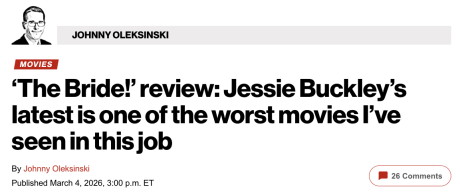
The atrociously reviewed The Bride! will not become a Norbit situation for Jessie Buckley — her Hamnet Best Actress Oscar is 100% locked and assured — zero Bride! fallout.
In the view of N.Y. Post critic Johnny Oleksinski, Maggie Gyllenhaal‘s The Bride! is “one of the absolute worst movies I have had the displeasure of watching in this job. Only seconds in, I regretted leaving my trusty torch and pitchfork at home.”
Den of Geek‘s David Crow: “At the risk of banality when discussing Frankenstein, The Bride! is a monstrosity of half-finished flourishes and fancies that’s been stitched together into what could charitably be called an abomination.”
Variety‘s Owen Gleiberman: “The Bride! is a stitched-skin-and-black-lipstick version of an outlaws-in-love saga. It’s like Joker 2 starring a grunge version of the Munsters, with dollops of Sid and Nancy and Natural Born Killers.”
“Pretty much everything here feels like it’s being done for effect rather than to convey real emotion. That’s the case especially with Jessie Buckley’s shouty performance in the title role. What a strange quirk of timing that the Irish actress will likely be winning an Oscar for Hamnet just as this wretched mess is unleashed upon the world.” — THR‘s David Rooney.
Trump Has No Choice But To Blast This Guy Into Chunks of Flesh, Blood and Bone
N.Y. Times reporter Shawn McCreesh, posted yesterday morning (3.3.26):
“While meeting with Chancellor Friedrich Merz of Germany in the Oval Office on Tuesday morning, President Trump decided to publicly answer reporters’ questions about his war on Iran for the first time.
“One of the first questions he got was this: What does he imagine the worst-case scenario in Iran to be?
“’I guess the worst case would be we do this and somebody takes over who’s as bad as the previous person,’ Trump said. ‘Right, that could happen? We don’t want that to happen. It would probably be the worst…you go through this, and then in five years you realize you put somebody in who’s no better.”
This means, obviously, that Mojtaba Khamenei, the 57 year-old son and likely heir apparent of the recently murdered Ali Khamenei, Iran’s Supreme Leader until last weekend…this means that Mojtaba has to be blown into a lumpy mound of strawberry preserves…splattered brain bits, hair on the walls.


Women Have Been Down on “Marty Supreme” All Along
If Marty Supreme‘s Timothee Chalamet somehow loses out on the Best Actor Oscar later this month, you can blame the womenfolk. They just don’t like Marty’s attitude…his relentless jazzcat pogo-stick amorality…and the film’s hellzapoppin vibe in general, and that’s why Josh Safdie‘s film was elbowed aside at the BAFTA and SAG awards. Or so I’m telling myself.
Just as chicks jeopardized the Best Documentary chances of Louis Psihoyos‘ The Cove (they wouldn’t even go see it), the XX chromosone suppressionists are dead set against embracing Marty Supreme because the lead character is not a stalwart nest defender…he’s footloose and careless…a me-me-me chaos agent…a stone-skimmer.
THR‘s Scott Feinberg recently tried to explain the Marty animus as follows:
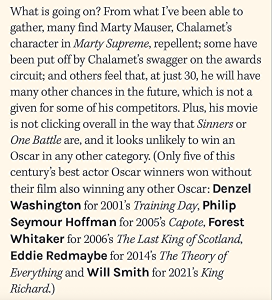
Feinberg doesn’t want to get into trouble so he says “many” find Chalamet’s titular character “repellent”. But deep down he’s saying the gals aren’t digging him.
Eleven weeks ago I called Marty Supreme “a primal knockout thing… entirely driven by Timothee Chalamet’s amoral, selfish, thoughtless, greedy-as-fuck young guy (but greedy for juice, triumph, acclaim and glory rather than money) who’s a serious go-getter, prick, thief, pusher and hustler, not to mention a gifted ping-pong athlete…a guy who never stops and never hesitates…okay, he acquires a little character and a couple of twinges of self-doubt toward the end, but ladies and germs and all the ships at sea…this is world–class cinema!…an alive, contentious and heavy-chugging run-around and hop-around fever dream that never lets you know what’ll happen next.”
For a while there the dynamic Chalamet looked like the presumptive Best Actor Oscar winner of 2026. And then more and more of the rank-and-file began to see it, and by this I mean more and more progressive feminists who kinda sorta hate guys anyway. They frowned and sniffed and shared their thumbs-down reactions around town…not just their disapproval of the obnoxiously self-consumed, intractably amoral Marty Supreme character but also, correspondingly, Chalamet himself because he’s so good at inhabiting this frenetic, appalling fellow.
HE review: “Chalamet constantly, compulsively, deplorably and always half-charmingly lies, takes, deceives, uses, goads, wounds, gives head, impregnates, insults, boasts, bullshits. And it’s not about morality or ‘story’ or even who wins the big climactic ping-pong match in Japan, this thing…well, it’s finally about shards of decency and morality toward the end, but Marty Supreme is primarily and gloriously about character…and that’s what’s exciting about it. Character, values (or lack of), choices. Coming aggressively from the gut.”

HE to Music Box Films: “Wake Up!”
Two days ago (4.2.26) I asked why Music Box Films is “suppressing awareness” of its 4.3.26 release of Francois Ozon‘s The Stranger, which premiered six months ago at the 2025 Venice Film Festival. I called these lazy bones out on the carpet, you bet. Today, shaken out of their lethargy, the Music Box guys finally got their act in gear by releasing a Stranger trailer.
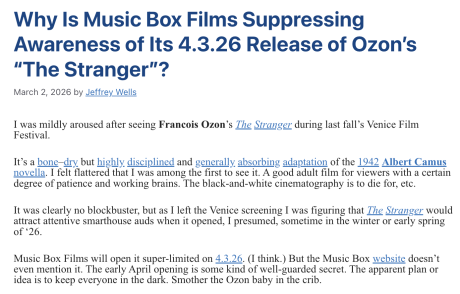
Had Honestly Never Heard The Term “Looksmaxxing” Before Today
From Christine Emba‘s “The Reason Gen Z Isn’t Dating,” posted in the N.Y. Times on 3.3.26.
“Multiple studies show that young people aren’t dating, having sex or forming partnerships.
“A recent survey of young adults from the Institute for Family Studies and Brigham Young University’s Wheatley Institute found that only 30 percent of its respondents were actively dating, despite about half of them indicating that they were interested in finding a relationship. They cited a lack of confidence in what the researchers termed ‘dating efficacy’: Fewer than 40 percent believed themselves to be attractive to potential partners or felt comfortable discussing their feelings with them.
“Only around a quarter felt confident in approaching a potential partner or in their ability to stay positive after a dating setback — a rejection, a bad date or a breakup.
“If trends continue, one in three adults currently in their 20s will never marry, contributing to an epidemic of loneliness that is already generationally acute.”
Scott Galloway has been Paul Revere-ing this lonely and isolated state of affairs for the last few years, of course.
Boomers Who Watched “2001” Ripped, Gazing Into AI-Saturated World of 2026
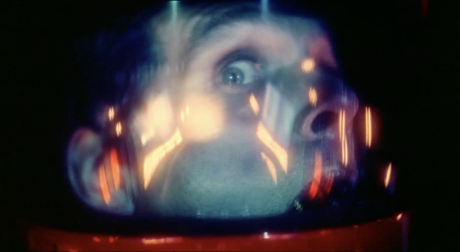

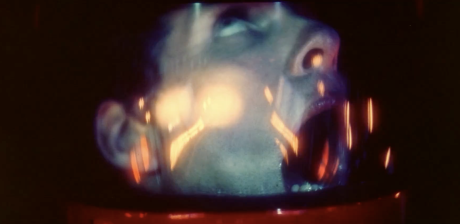
Renata Adler‘s N.Y Times review of 2001: A Space Odyssey, published on 4.4.68:
“Even the MGM lion is stylized and abstracted in Stanley Kubrick‘s 2001: A Space Odyssey, a film in which infinite care, intelligence, patience, imagination and Cinerama have been devoted to what looks like the apotheosis of the fantasy of a precocious, early nineteen-fifties city boy.
“The movie, on which Kubrick collaborated with the British science-fiction author Arthur C. Clarke, is nominally about the finding, in the year 2001, of a camera-shy sentient slab on the moon and an expedition to the planet Jupiter to find whatever sentient being the slab is beaming its communications at.
“There is evidence in the film of Clarke’s belief that men’s minds will ultimately develop to the point where they dissolve in a kind of world mind. There is a subplot in the old science-fiction nightmare of man at terminal odds with his computer. There is one ultimate science-fiction voyage of a man (Keir Dullea) through outer and inner space, through the phases of his own life in time thrown out of phase by some higher intelligence, to his death and rebirth in what looked like an intergalactic embryo.
“But all this is the weakest side of a very complicated, languid movie — in which almost a half-hour passes before the first man appears and the first word is spoken, and an entire hour goes by before the plot even begins to declare itself.
“Its real energy seem to derive from that bespectacled prodigy reading comic books around the block. The whole sensibility is intellectual fifties child: chess games, bodybuilding exercises, beds on the spacecraft that look like camp bunks, other beds that look like Egyptian mummies, Richard Strauss music, time games, Strauss waltzes, Howard Johnson’s, birthday phone calls.
“In their space uniforms, the voyagers look like Jiminy Crickets. When they want to be let out of the craft they say, ‘Pod bay doors open,’ as one might say ‘Bomb bay doors open’ in every movie out of World War II.
“When the voyagers go off to plot against HAL, the computer, it might be HAL, the camper, they are ganging up on. When HAL is expiring, he sings ‘Daisy.’ Even the problem posed when identical twin computers, previously infallible, disagree is the kind of sentence-that-says-of-itself-I-lie paradox, which — along with the song and the nightmare of ganging up — belong to another age.
“When the final slab, a combination Prime Mover slab and coffin lid, closes in, it begins to resemble a fifties candy bar.The movie is so completely absorbed in its own problems, its use of color and space, its fanatical devotion to science-fiction detail, that it is somewhere between hypnotic and immensely boring. (With intermission, 2001 is three hours long.)
“Kubrick seems as occupied with the best use of the outer edge of the screen as any painter, and he is particularly fond of simultaneous rotations, revolving, and straight forward motions—the visual equivalent of rubbing the stomach and patting the head.
“All kinds of minor touches are perfectly done: there are carnivorous apes that look real; when they throw their first bone weapon into the air, Kubrick cuts to a spacecraft; the amiable HAL begins most of his sentences with ‘Well,’ and his answer to ‘How’s everything?’ is, naturally, ‘Everything’s under control.’
“There is also a kind of fanaticism about other kinds of authenticity: space travelers look as sickly and exhausted as travelers usually do; they are exposed in space stations to depressing canned music; the viewer is often made to feel that the screen is the window of a spacecraft, and as Kubrick introduces one piece of unfamiliar apparatus after another — a craft that looks, from one angle, like a plumber’s helper with a fist on the end of it, a pod that resembles a limbed washing machine — the viewer is always made aware of exactly how it is used and where he is in it.
“The special effects in the movie — particularly a voyage, either through Dullea’s eye or through the slab and over the surface of Jupiter-Earth and into a period bedroom—are the best I have ever seen; and the number of ways in which the movie conveys visual information (there is very little dialogue) drives it to an outer limit of the visual.
“And yet the uncompromising slowness of the movie makes it hard to sit through without talking — and people on all sides when I saw it were talking almost throughout the film. Very annoying. With all its attention to detail — a kind of reveling in its own I.Q. — the movie acknowledged no obligation to validate its conclusion for those, me for example, who are not science-fiction buffs. By the end, three unreconciled plot lines — the slabs, Dullea’s aging, the period bedroom — are simply left there like a Rorschach, with murky implications of theology.
“This is a long step outside the convention, some extra scripts seem required, and the all-purpose answer, ‘relativity,’ does not really serve unless it can be verbalized.”
How “Sinners” Could Have Saved Itself
Sinners star Michael B. Jordan is the second actor in film history to be Oscar-nominated for playing twin brothers. He plays the Smokestack twins, the older Elijah “Smoke” Moore and the younger Elias “Stack” Moore, both of them skillful at cunnilingus.
The first dual-character performance to be Oscar-nominated (and, so far, the only one to win an actual statuette) was, of course, Lee Marvin in Cat Ballou (’65). He played the comically alcoholic gunslinger Kid Shelleen as well as Shellen’s tin-nosed brother Tim Strawn, who was also played for chuckles.
My God…a bolt-of-lightning perception just hit me! Sinners could have not only hit the jackpot but also become an artistically bulletproof film if — I’m getting the chills just typing this — director-screenwriter Ryan Coogler had decided to treat the material with a comedic attitude…if he’d shot it like a black comedy.
The moral current about rural old-South racism and KKK yokels wouldn’t have been diluted in the slightest if he had. Ditto the musical portions and the ties to the legend of Robert Johnson and the Delta blues. Ditto the cunnilingus sex scenes. But the over-the-top vampire stuff would have played much better if Coogler had gone for laughs. Cat Ballou meets From Dusk to Dawn, something in that vein.

